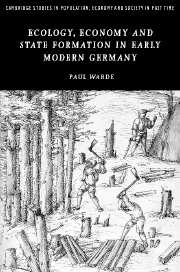Book contents
- Frontmatter
- Contents
- List of figures
- List of maps
- List of tables
- Acknowledgements
- Glossary
- List of abbreviations
- Introduction
- 1 The peasant dynamic
- 2 Power and property
- 3 The regulative drive
- 4 From clearance to crisis?
- 5 The two ecologies
- Conclusions
- Bibliography
- Index
- Cambridge Studies in Population, Economy and Society in Past Time
2 - Power and property
Published online by Cambridge University Press: 24 July 2009
- Frontmatter
- Contents
- List of figures
- List of maps
- List of tables
- Acknowledgements
- Glossary
- List of abbreviations
- Introduction
- 1 The peasant dynamic
- 2 Power and property
- 3 The regulative drive
- 4 From clearance to crisis?
- 5 The two ecologies
- Conclusions
- Bibliography
- Index
- Cambridge Studies in Population, Economy and Society in Past Time
Summary
The key to understanding the particular ‘peasant dynamic’ of early modern Württemberg is the collective institution that played the greatest role in governing village resources, the commune and its court. While there was little that was ‘immobile’ about this society, it nevertheless appeared little altered in the early eighteenth century from the world of the sixteenth or early seventeenth century. This was true not only of its levels of productivity and agricultural techniques, but equally, as we will see, the social order. A major contributor to this degree of stability was the continued ambition of certain groups within the village to employ collective measures to regulate village life, measures that generally worked in tandem with those promulgated by central government. This world was generated by institutional effort, and the manner in which village institutions managed the resources available to them. Early modern Württemberg was clearly a very unequal society. Property holding conferred institutional power and thus societal development was shaped by particular interests. Nevertheless, communal institutions themselves allowed far wider access among the populace to resources held as communal property than was the case for the resources that were held as private property, access to which was more inequitably distributed. Even if shares in communal property were also ‘inequitably’ apportioned, by an overwintering rule, for example, or allotting wood according to the size of one's property, overall this property system still probably worked to the advantage of the poor.
- Type
- Chapter
- Information
- Ecology, Economy and State Formation in Early Modern Germany , pp. 99 - 160Publisher: Cambridge University PressPrint publication year: 2006

